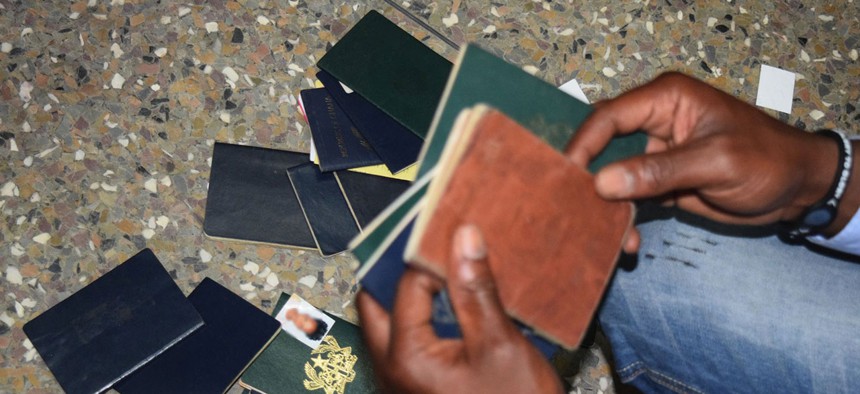
Fake passports confiscated during a raid on a fake US embassy in Accra, Ghana. State Department photo
A Fake U.S. Embassy Operating in Ghana for the Past Decade Has Been Shut Down
Beneath a photo of president Barack Obama, staff posing as consular officials, took visa applications from unsuspecting Ghanians.
For the last decade, a fake US embassy has been operating in Accra, Ghana. On Mondays, Tuesdays, and Fridays, from morning until half noon, an American flag would fly outside a faded pink building. Inside, beneath a photo of president Barack Obama, staff posing as consular officials, took visa applications from unsuspecting Ghanians and other West Africans. The office also issued fake passports, visas, and other documents for about $6,000 a service.
The operation has now been shut down, according to the US state department. Staff at the real US embassy in Accra, after getting a tip about the fraudulent embassy, raided the operation this summer with the help of Ghanaian security. Authorities recovered 150 passports, as well as fake visas for the US, the EU’s Schengen zone, India, and South Africa. Three men were arrested, according to Ghanaian police.

The exterior of a now-closed building in Accra that purported to be a US embassy. (State Department)
The faux embassy is part of a larger problem of travel document fraud in the region, fueled in large part by the difficulty of getting travel visas as an African. In January, another group of men, who recruited customers from foreign embassies after they had been refused a visa, was also arrested. They were found with 190 passports, according to local media.

Visa paperwork seized during a raid on a fake US embassy operating in Accra. (State Department)
In response, the US embassy in Ghana has launched a campaign, “Operation Spartan Vanguard,” to shut down other fraudulent operations. A fake Dutch embassy has also been operating in the city, according to the state department.
According to the state department, the scheme was run by Turkish and Ghanians syndicates with the help of some Ghanaian officials. The operation in Accra was done with the tacit approval of officials, openly advertising its services on flyers and billboards throughout the country. Two satellite locations, a dress shop and an apartment, were also used. The dress shop, which did sell dresses as well as make alterations, used its industrial sewing machine for the binding of fake passports.
“The investigation and search for the Turkish organized crime group is ongoing,” the embassy said in an article about the case. “Criminal leaders no longer have the political cover they once had… this is only the beginning.”
NEXT STORY: Use Your Head: Don’t Be Seduced By Technology







